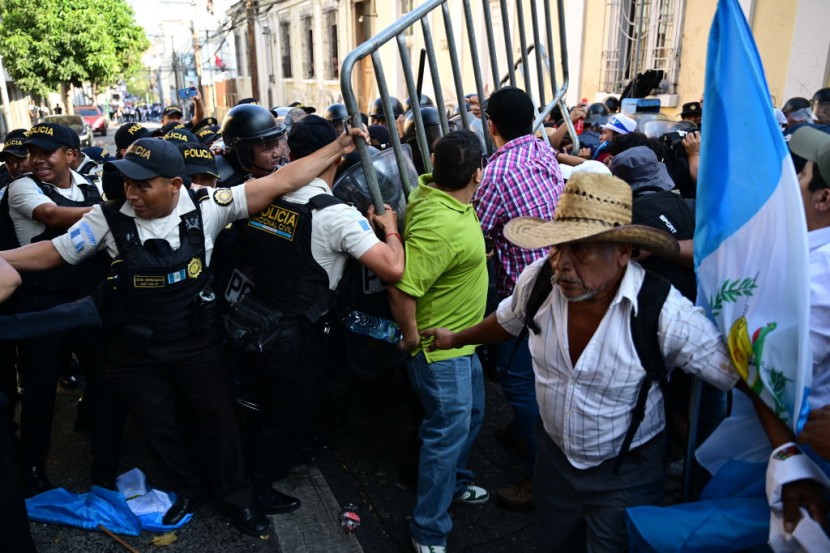Guatemalan President-elect Bernardo Arévalo anxiously awaited his inauguration on Sunday, while facing frustrating delays from the old-guard Congress.
The delay has sparked angry protests from demonstrators who are exhausted by the months-long attempts to prevent him from assuming office.

Frustrated by yet another delay, supporters who had been waiting for hours for a festive inauguration celebration in Guatemala City's Plaza de la Constitucion decided to take matters into their own hands. They marched towards the building where congress was meeting.
A heated confrontation ensued between the protesters and the riot police, forcefully pushing them aside. The demonstrators then congregated outside the congress, urging the legislators to put an end to the delays and announce the delegation that should participate in the ceremony.
According to Dina Juc, the mayor of the indigenous village of Utatlàn Sololá, the demonstrators are determined to swear him in if the authorities fail to do so. The inauguration was marked by ongoing legal disputes and heightened tensions, mirroring the atmosphere that has persisted since Arévalo's decisive election win on August 20.
During the inauguration, Congress faced internal conflicts as members engaged in heated debates over the recognition of individuals within the congressional delegation. Tensions ran high as members passionately expressed their differing opinions.
The leadership commission responsible for this was filled with individuals who were opposed to Arévalo's agenda, and the decision to delay was perceived as a strategic move to prolong the inauguration and undermine Arévalo's position.
According to Román Castellanos, a congressman from Arévalo's Seed Movement, the commission's review of legislators' credentials is being criticized for its lengthy duration and the imposition of requirements that are not mandated by law.
In a recent statement on his social media accounts, Arévalo expressed concern over what he perceives as attempts to undermine democracy through the use of illegal tactics, trivial matters, and abuses of power.
In a statement on behalf of the foreign delegations present at the inauguration, Luis Almagro, the secretary general of the Organization of American States, emphasized the importance of the congress transferring power to Arévalo and upholding the will of the people as expressed in the elections.
The attorney general, Consuelo Porras, made numerous attempts to prosecute or imprison Arévalo before he assumed office, utilizing various legal strategies. Arévalo's party is unlikely to secure a majority in Congress and may not even receive formal recognition there.
Per NBC News, Arévalo is a multi-talented individual with a strong academic background and experience in diplomacy. His election brought about a significant shift in the political landscape, as the population was eager for change and tired of the prevailing issues of corruption and impunity.
International Leaders React to President-Elect Bernardo Arevalo's Victory
Samantha Power, the US aid chief, expressed certainty that Arevalo is the president of Guatemala and urged everyone involved to stay calm.
Taiwan, which has diplomatic ties with Guatemala, stated through its foreign ministry that it unequivocally recognizes Arevalo and Herrera as the president and vice president of the country.
Honduran Foreign Minister Enrique Reina emphasized the importance of respecting Arevalo's inauguration in a message shared on X. He conveyed this message on behalf of the delegations present in Guatemala, including those from the Organization of American States (OAS) and the European Union.
In a resounding triumph, Arevalo, 65, emerged as the victor in the August presidential run-off in Guatemala, a nation of 17.1 million people. With a firm commitment to rejuvenating democracy and eradicating pervasive corruption, he aims to bring about positive change.
In the months following, Guatemala's attorney general, who is perceived as a supporter of outgoing President Alejandro Giammattei, has been making increased efforts to undermine Arevalo's win and impede his transition. The attorney general has made attempts to remove legal immunity from Arevalo and his Vice President-elect Karin Herrera, suspend their Semilla party, and invalidate the election.
Tens of thousands of Guatemalans have taken to the streets in what Arevalo refers to as an attempted coup.The international community, including the United States, has exerted significant pressure on Giammattei's administration to move forward with the transition of power.
Last month, the US government implemented additional visa restrictions on approximately 300 Guatemalan nationals. Among them were 100 lawmakers from the 160-member unicameral Congress. These individuals have been accused of undermining democracy in the Central American nation, according to Reuters.
The events preceding Arevalo's inauguration highlight the precarious state of Guatemala's legal system, as the country teeters on the edge of a governance crisis that may impede his capacity to govern and fulfill his promises to combat corrupt politicians, tackle organized crime, and generate employment opportunities.








